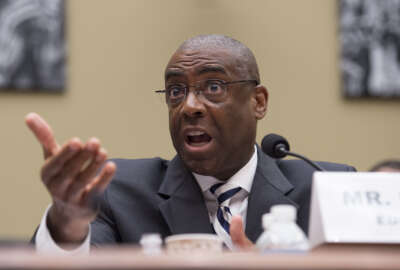
Education CIO, US-CERT director decide to leave government
Danny Harris, the Education Department’s chief information officer for the last seven years, decided to retire after 32 years in government.
Danny Harris decided he had enough of the berating from the House Oversight and Government Reform Committee, and he joined a growing list of long-time federal employees who decided to retire instead of face more aggravation.
Harris came under intense, and probably well-deserved, scrutiny earlier this month for some of his non-federal government related activities. He said they were hobbies, while lawmakers and the agency’s inspector general said they were outside businesses, which Harris pursued on government time. Lawmakers also were less than happy with Harris’s efforts to protect the data and systems run by the Department of Education. Rep. Jason Chaffetz (R-Utah), the chairman of the committee, said Education is putting the data of more than 139 million Americans at risk.
In a note to staff on Feb. 19, Harris said he will pursue other opportunities and his last day will be Feb. 29.
“I have had what I consider a dream career, full of both accomplishments and failures. The vast majority of my accomplishments actually came at the hands of many of you,” Harris wrote in the note obtained by Federal News Radio. “And I will forever be grateful for the tremendous support you have provided me. In contrast, I would not trade my failures for they truly allowed me to grow to become the executive I am today. I hope that you feel I am leaving OCIO in a better place than it was when I arrived. If not, I hope you at least know that this was my intent and I did everything in my power to achieve this goal.”
The Education Department confirmed Harris’ decision to retire, and said Steve Grewal, the deputy CIO, will be acting CIO until a permanent one is named. Andrew Jackson, Education’s assistant secretary for management, also will play a role in overseeing the day-to-day operations and management of the CIO’s office. Jackson had a similar role during his time at the Interior Department.
“Danny had previously considered retirement but decided to stay on to see the department through the administration’s Cybersecurity Sprint. Having made significant progress in recent months towards the department’s cybersecurity goals, and because he did not want to risk becoming a distraction to the department’s critical ongoing cybersecurity work, Danny has decided that now is the right time for him to retire and explore opportunities outside the department,” said Dorie Turner Nolt, the press secretary for the Department of Education, in a statement. “We are grateful to Danny for his decades of service and wish him and his family well in their future endeavors.”
In addition to the lawmakers’ probe, Harris’s health also played a role in his decision. He collapsed after the nearly three-hour hearing.
“I have six more days in the office and I plan to work every one of them,” Harris said in his email to staff. “I will be around all next week to close out various tasks and pack. If I don’t get a chance to see you before I leave, please know that I wish you all the best and will always be the biggest cheerleader for the success of OCIO and the department.”
Harris worked for the government for 32 years, including the last seven as the Education Department CIO. He worked at Education his entire career, starting as a computer analyst and making stops as the deputy CFO and as acting director of financial management operations.
Along with Harris, one of the Homeland Security Department’s top cybersecurity experts is leaving government.
Ann Barron DiCamillo, the director of the U.S. Computer Emergency Readiness Team (US-CERT), announced her decision to move to the private sector.
Barron DiCamillo’s last day is Feb. 22. She has been the director of US-CERT since January 2013, and before that worked for seven years in government — four years with the Defense Information Systems Agency and three years with the Commerce Department. She also spent time in between those two stints as a director with Jefferson Consulting Group.
Brad Nix, the deputy director of US-CERT, will step in as acting director until a permanent replacement is found.
FCW first reported Barron DiCamillo was leaving DHS.
On the positive side, the Defense Department named Daniel Payne as the new director of the Defense Security Service.
Payne replaces Stan Sims, who retired in early January.
He comes to the DSS after spending the last 30 years working for the government in counterintelligence, including being the lead investigator in the Aldrich Ames case. Ames was convicted in 1994 of spying for the Soviet Union and Russia during his 31-year CIA career.
Payne also served as a special agent for the Defense Investigative Service and was involved in numerous other espionage investigations and founded the use of financial forensic techniques as a means to identify spies in the government.
Payne currently is the deputy director of the National Counterintelligence and Security Center.
DSS said he will transition to DSS over the next 30 days.
As the 13th director of DSS, Payne will lead the agency in support of national security and the warfighter, secure the nation’s technological base, and oversee the protection of U.S. and foreign classified information in the hands of industry.
Return to the Reporter’s Notebook
Copyright © 2024 Federal News Network. All rights reserved. This website is not intended for users located within the European Economic Area.
Jason Miller is executive editor of Federal News Network and directs news coverage on the people, policy and programs of the federal government.
Follow @jmillerWFED






